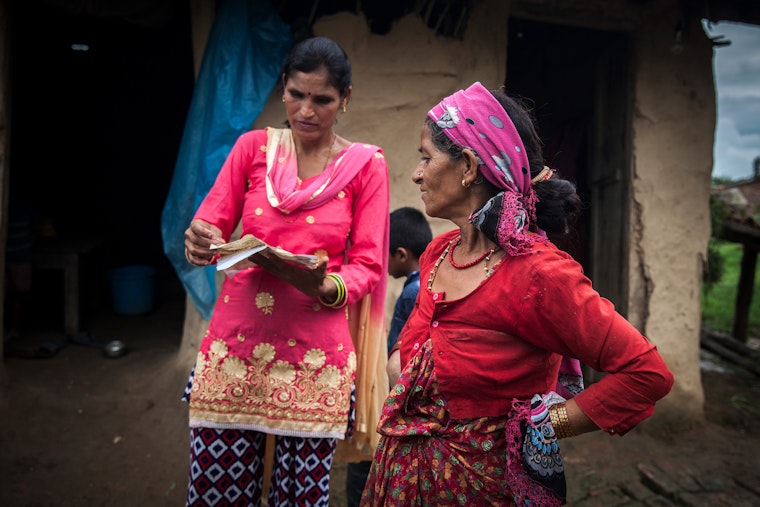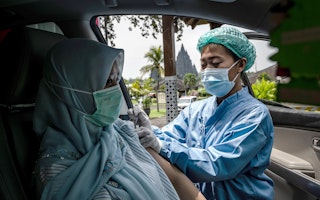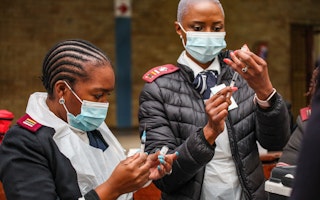How the Law Can Empower Victims of COVID-19
By Stephen Golub & Zaza Namoradze

Amid the COVID-19 pandemic, governments around the world face two immediate, fundamental demands: to protect public health, and to counter the economic damage being done. In both cases, the burden of response falls mainly on government, which has the scale and—in theory, at least—resources required.
But how should those affected respond when they see corrupt government officials syphoning off funds? What about when their community is offered inadequate medical care, or deprived of access to emergency funds? What role should justice play?
The history of development shows us that this is where independent civil society groups have a vital role to play in delivering more equitable outcomes—in particular, by helping people to use the law to ensure they are treated fairly.
The Scottish government recognized this in its response to the economic crisis that began in 2007. Facing rising public demand for legal assistance with debt advice, welfare benefits, bankruptcy, housing, and mediation, the government developed an enhanced community legal services program that employed an interagency mix of funds administered by the Scottish Legal Aid Board.
The Argentinian government pursued a similar approach two years ago. Though an economic downturn drove it to cut public spending across other sectors, the Ministry of Justice continued to fund local legal advice offices to reach communities living in extreme poverty, and to focus on legal empowerment to advance critical social protection rights.
Why prioritize these kinds of legal empowerment and community-based justice services to begin with? Legal empowerment is important because it addresses the legal needs and rights of people themselves, while helping them to know, use, and reform the law. It can overcome the injustices that affect their daily lives.
Community-based justice services deliver legal knowledge, assistance, and, above all, power to people previously deprived of meaningful access to the law. Mainly though not exclusively carried out by civil society organizations, its grassroots orientation presents a complement to the top-down focus that dominates law-oriented international development aid today.
The need for legal empowerment is even more acute in view of the COVID-19 crisis. The massive economic and social dislocations under way are triggering even greater needs for legal help for populations affected by corruption, health challenges, joblessness, discrimination, and other problems intensified by the pandemic. Support for appropriate governmental and civil society efforts alike must increase accordingly.
There is a substantial track record of legal empowerment (or legal empowerment-adjacent) strategies helping to combat corruption [PDF] in the administration of public health, social safety nets, and other vital services. Moreover, there is a track record of civil society–run legal empowerment initiatives working to benefit service delivery and policy reforms [PDF] in public health. Legal empowerment helps ameliorate the crushing realities of poverty and inequality, while also challenging the structures that helped create these conditions in the first place.
Over the past four years, the Open Society Foundations have pursued a Legal Empowerment Network Strategy that has sought to strengthen community-based justice services—and the broader legal empowerment field—in over a dozen low-, middle-, and high-income countries. This strategy has also led Open Society to support efforts from both governments and civil society. For example, Legal Empowerment Network Strategy–supported surveys in those countries have documented a crisis in access to justice, one that especially affects the poor and other marginalized populations.
Open Society’s Legal Empowerment Network Strategy has also supported the evolution of political, financial, and policy approaches, all of which must further evolve if legal empowerment is to become more secure and sustainable. One such approach is to include new funding from governments for community justice groups within their borders. Another approach is to welcome an increase in government-backed political and financial support for civil society organizations engaged in legal empowerment in most countries across the globe.
Even before the current pandemic, the 2019 Pathfinders Justice Task Force presented a devastating indictment. Two-thirds of humanity, the task force found, suffers due to insufficient or nonexistent access to justice. Meanwhile, an estimated 244 million people are victimized by slavery, statelessness, violence, or extreme lawlessness. And 1.5 billion are unable to resolve their disputes (or other justice-oriented problems) due to structural injustices or barriers. Last, but not least, the task force reported that 4.4 billion people are excluded from ostensibly law-protected opportunities.
Whether concerning a family matter; the wrongful treatment at the hands of a landlord, employer, or lender; or a host of other issues, civil justice problems affect most people. But as a World Justice Project report recently established, these kinds of problems disproportionately harm poor and otherwise vulnerable populations—the very same people who are disproportionately suffering both the health and economic impacts of the pandemic.
Now, the COVID-19 crisis has intensified the already existing need for people to realize greater justice in their lives, and for the law to be democratized. This is not only about human rights, as important as they are; it’s also about accountable service delivery, and even survival. That’s why legal empowerment must be part of any adequate response to this crisis, as well as a crucial element of an equitable resolution.
Stephen Golub is a consultant and scholar who has taught at Berkeley Law School and Central European University and has worked with many major development agencies, foundations, and policy institutes.

Zaza Namoradze is senior program advisor for Justice at the Open Society Foundations.


